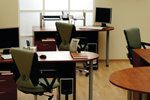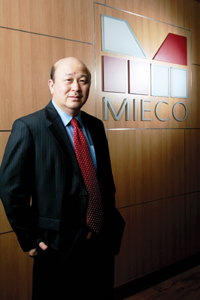Looking ahead
10 February 2009Mieco is part of the Bandar Raya Developments Bhd Group of Companies. It started up its first particleboard (or chipboard) line in 1976 and claims that, in the process, it became the first panel maker in Malaysia to utilise rubberwood as its raw material.
The company today has two particleboard factories, located in Gebeng and Kechau Tui, Pahang and these have a combined capacity of approximately 900,000m3 a year. The most recent of these lines is the one in Kechau Tui, near Kuala Lipis.
Mieco’s headquarters is on the 30th floor of an office building in the centre of Kuala Lumpur and it was there that I went to interview managing director Dato’ Yong Seng Yeow (the word Dato’ is equivalent to the title ‘Sir’ in the UK).
Mieco’s first line was built in Semambu in 1976. However, it ceased production early in 2005 as its Dieffenbacher single-opening press was no longer economical, explained Dato’ Yong. The line is ‘mothballed’ and awaiting sale.
The second line, in Gebeng, has a Siempelkamp ContiRoll continuous press and was still running to full capacity at the time of our meeting in early December 2008. All the production of this line is subject to value-adding, with melamine faced chipboard (MFC), paper faced electron beam-cured panels, polymer-faced boards and direct post-formed panels for use as worktops, door elements and office automation system (OA) furniture. Of this production, 40% is for domestic markets and 60% is exported, to over 20 countries.
Mieco Livin Style is a range of DIY book shelves, CD towers and other items of furniture.
Mieco had a long-standing relationship with German particleboard maker Kunz and since Kunz’s takeover by another German panel manufacturer, Pfleiderer, the relationship has continued and Mieco is now selling Pfleiderer’s high pressure laminate, Duropal, as part of its range.
“We also carry out benchmarking on downtime, reject panels and so on and exchange this and technical information with Pfleiderer,said Dato’ Yong. “We thus know where we stand in terms of efficiency compared with European producers and can see areas where we need to improve to be more efficient. We also benchmark costs to see where we can save money.”
The most recent plant at Kechau Tui (Lipis) went into production in 2005 with a brand new Dieffenbacher CPS continuous press line (WBPI Feb/March 2005). The press is 41.6m long and the foundations and all ancillary equipment were built to allow for extension to 60m – something which Mieco still plans to do when the market is right.
“The plant was doing well until August last year, then the market turned down and crude oil, and therefore resin, prices rose steeply. That was a dreadful time for us,said Dato’ Yong. “We are currently running at about 65% of total capacity at Lipis; we have stopped Sunday working and are running shorter shifts whereas we used to run 24 hours, 362 days a year.”
That hasn’t changed the company’s intention to invest in improving efficiency at the mill and plans are well under way to replace the energy system at Lipis.
“We are currently using diesel fuel to heat the thermal oil and have been planning to put up an energy plant utilising waste from our factory and oil palm waste too. That project will go ahead and will take about 15 months to realise,said the managing director. “We are talking to a number of potential suppliers worldwide at the moment. However, the Malaysian government is encouraging the use of oil palm waste to make biofuel for transport at a substitution rate of 10-15% and that will increase competition for raw material for our energy production.”
In terms of competition in the panel market, Dato’ Yong predicts there will be changes: “I believe there will be some consolidation in Thailand and Malaysia. In Malaysian MDF we have already seen it happening with Dongwha and Evergreen [taking over some mills]. There used to be six or seven companies in Malaysia but now there are basically two, plus Robin Resources.
“In particleboard, the smaller mills will find it difficult to compete. The biggest competition is from Thailand with Vanachai, Metro, Green River Panels, Panel Plus, Rayong – and to a lesser extent SPB.
“But the demand is still there for particleboard and it was not generally being affected by MDF until recently when MDF prices came down, but I think that is temporary.”
Mieco is considering going into MDF and other related panel manufacturing itself in the longer term to enable it to offer the full panel range from one source.
“Right now, though we are talking about survival,said the managing director. “We have to pull through this difficult period, then we will be stronger. Then we can look at expansion. We will also consider building a glue plant, given our current capacity of around 900,000m3 on lines two and three combined.”
When the company goes ahead with its planned press extension at Lipis, the mill will have a capacity of 2,000m3/day rather than the current 1,500m3, making a resin plant even more desirable.
In fact line two in Gebeng, built in 1995, has a nameplate capacity of 620m3 a day but is now capable of 800m3, thanks to a little ‘tweaking’ by Mieco staff.
Looking to the future wood supply, Mieco is actively engaged in research & development (R&D), in cooperation with a Malaysian institution and an overseas partner, on replacing rubberwood and tropical hardwoods with plantation species with a shorter rotation.
“We are fortunate that in Mentakab in the state of Pahang – between our mill sites in Kuantan and Lipis – we have 10,000 acres given to us by the government for plantations and so we can either plant the results of our R&D, or acacia, or rubberwood,said Dato’ Yong.
“The government will have to facilitate manufacturers who export,he said. “It needs to get its act together to increase the amount of rubberwood plantations and it needs to help us bring down our energy costs. A couple of years ago rubber prices were very high and that meant the trees were not cut. The government has given some encouragement to replanting, with a RM200m (US$55m) grant, and that is a good sign.
“There are two programmes – for latex production and wood production – in which the government gives the planters a 3% ‘soft’ loan where they only pay interest after they have harvested the wood or the latex. This will help but the gestation period is very long.”
Whether markets are good or bad, panel producers have to meet all the latest standards and Mieco has been active in that area too.
“We have had CARB [California Air Resources Board] certification since last October [certified by PSI] and we have just gained JIS [Japanese Industrial Standard] certification,said Dato’ Yong. “We already had JAS [Japanese Agricultural Standard] but JIS is at a higher level. We are producing F**** and F***, and Super E0 panels, using conventional urea resins with formaldehyde scavengers.”
The company is also in the process of getting its wood supply certified with chain of custody – certifying that it comes from a legal and sustainable source – and Dato’ Yong expected that certification before March this year.
Mieco also has ISO14001 environmental standard, 18001 occupational health and safety, 9001 quality assurance and Lloyds register quality certification.
The company is clearly ready for the upturn in the market when it comes and has many plans in place to take full advantage of any improvement and to capitalise on its strengths as a sizeable particleboard producer.


